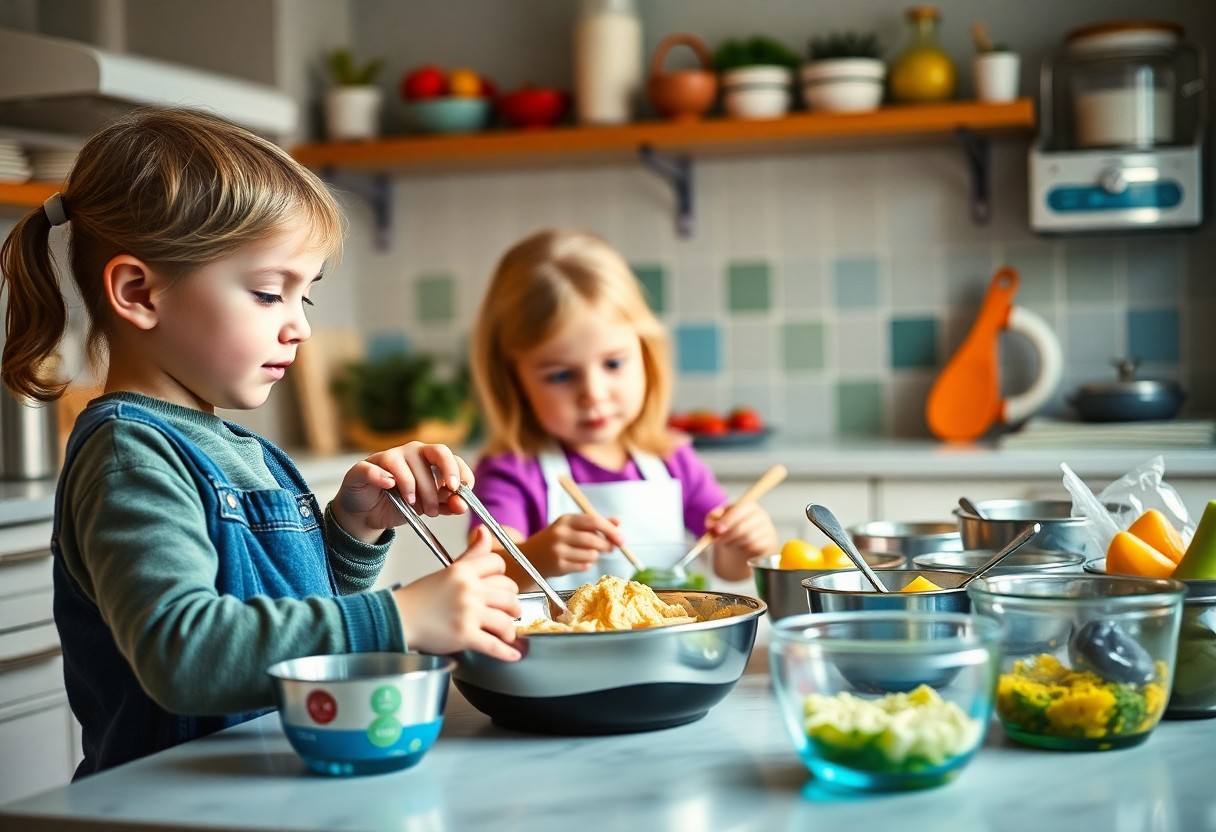Simple Easy Recipes To Teach Kids Cooking Skills

Superfoods For Every Season – Eat Fresh Year-Round
October 29, 2024
The Ultimate Guide To Meal Prepping With Superfoods
October 30, 2024With the right approach, you can empower your children with important cooking skills that will benefit them for a lifetime. Teaching kids to cook not only fosters independence, but also encourages healthy eating habits and creativity in the kitchen. In this blog post, we’ll explore some simple and easy recipes designed specifically for young chefs, ensuring they get hands-on experience with safe kitchen practices and a sense of accomplishment. Whether you’re a parent or a teacher, these activities will make cooking fun and engaging for your little ones.
Benefits of Teaching Kids Cooking Skills
A variety of advantages accompany teaching your kids cooking skills, extending beyond the kitchen. Engaging your children in cooking promotes creativity, instills a sense of responsibility, and enhances their confidence. You will also find that cooking together offers a valuable bonding experience and equips children with necessary skills that they will carry into adulthood. Moreover, these experiences can foster independence and problem-solving capabilities that are beneficial throughout their lives.
Development of Life Skills
Benefits of teaching your kids cooking skills include the development of necessary life skills. As they learn to measure ingredients, follow directions, and manage kitchen tasks, they gain critical thinking, organizational, and time management abilities. These skills are not only applicable in cooking but will also serve them well in academics and future careers.
Encouragement of Healthy Eating Habits
One significant advantage of involving your kids in cooking is the encouragement of healthy eating habits. When children participate in meal preparation, they are more likely to be curious about and enjoy the food they create. This hands-on experience can make them more willing to try new fruits, vegetables, and wholesome ingredients that they might otherwise shy away from.
Considering the nutritional value of what you and your child create together can lead to better dietary choices. The positive association formed between cooking and eating healthy foods may reduce the chances of them developing unhealthy eating habits in the future. By teaching your kids to appreciate the process of cooking, you can promote an enduring interest in nutritious meals and lay the foundation for a lifetime of healthy eating.
Essential Cooking Techniques for Kids
Any budding chef needs to master some basic cooking techniques to build confidence in the kitchen. Simple skills like chopping, stirring, and measuring can make a big difference in your child’s cooking journey. Explore what are simple meals and recipes to teach children how … to cook for a great starting point.
Knife Skills
Across various cuisines, teaching your child proper knife skills is an important part of their culinary education. Start with safety first: always use a cutting board and ensure they are using an age-appropriate knife. Various cutting techniques like slicing, dicing, and mincing can be introduced gradually as they gain confidence.
Safe Cooking Practices
Among the most important aspects of cooking, safety cannot be overlooked. Involve your child in discussions about how to cook safely, such as never leaving the stove unattended and keeping hot surfaces away from fingers. Always use oven mitts, and teach them the importance of Washing hands and surfaces frequently.
Another key point is to establish clear rules around handling ingredients and tools. Ensure your child always keeps knives out of reach when not in use and teaches them to cut away from their body to avoid any accidents. Promote the use of non-slip mats under bowls to prevent them from sliding. By instilling these habits early, you can help your child develop a lifelong passion for cooking safely.
Simple Recipes to Get Started
It’s exciting to introduce your children to the world of cooking through simple recipes that can build their kitchen skills. Starting with basic dishes allows them to gain confidence and learn imperative techniques without feeling overwhelmed. These foundational recipes not only nurture their creativity but also pave the way for more complex culinary endeavors in the future.
Breakfast Ideas
Started with breakfast, you can teach your child to make scrambled eggs or fruit smoothies. These recipes are not only easy but also encourage them to explore flavors and textures while getting familiar with measurement and kitchen tools. Your child will love being in charge of the first meal of the day!
Lunch & Snack Options
Started by engaging your kids in creating their own lunches or snacks, they can explore new tastes while honing their cooking skills. Simple recipes like sandwiches, salads, or yogurt parfaits allow them to experiment with various ingredients and learn the importance of nutrition.
At home, making lunch and snack options can be a fun and interactive way to involve your kids in the kitchen. They can use fresh vegetables, grains, and proteins to create balanced meals. Start with basic salads where your child can practice chopping under supervision and assembling ingredients. Additionally, making sandwiches teaches spreading techniques and encourages creativity in choosing flavors. Above all, creating a safe kitchen environment ensures they are learning in a positive and supportive atmosphere.
Fun and Engaging Cooking Activities
Once again, cooking can be a delightful way to engage kids in practical learning. By incorporating fun and interactive activities, you can inspire their creativity while enhancing their cooking skills. Whether it’s creating colorful dishes or experimenting with flavors, these engaging activities will keep them excited about the culinary world. Aim for hands-on experiences that encourage exploration, teamwork, and self-expression in the kitchen!
Themed Cooking Days
Cooking themed days can transform your kitchen into a culinary adventure. Choose a unique theme, such as Italian Night or Taco Tuesday, and let your kids explore new flavors and techniques. This approach not only makes cooking exciting but also teaches them about different cultures and cuisines while sparking their interest in food.
Cooking Challenges
Between prepping ingredients and plating dishes, cooking challenges can really elevate the fun factor in the kitchen. You can create a friendly competition where kids face off in teams or as individuals to craft the tastiest meal with the given ingredients. This not only stimulates their creativity but also encourages problem-solving and teamwork. Plus, keep safety a priority by supervising their use of sharp knives and hot surfaces, reminding them of the importance of kitchen etiquette. Celebrating their successes, regardless of the outcome, builds confidence and instills a love for cooking!
Plus, these cooking challenges can introduce a variety of skills, including timing, ingredient selection, and taste-testing. By randomly assigning ingredients or imposing time limits, you can create memorable experiences that encourage kids to think on their feet. This not only enhances their cooking capabilities but also promotes adaptability in the kitchen. Foster a safe environment where they can learn from mistakes, reinforcing the idea that every challenge is a stepping stone to becoming a better cook!

Involving Kids in Meal Planning
Your involvement in meal planning can greatly enhance your children’s cooking skills. Engaging them in this process fosters a sense of responsibility and encourages them to express their preferences. By discussing various meal options and recipes, you empower your kids to make healthy choices and boost their confidence in the kitchen. This collaborative approach prepares them for future cooking tasks while allowing for creativity and fun!
Grocery Shopping Together
Among the many activities you can do with your kids, grocery shopping is a practical way to teach them about ingredients and budgeting. By letting them help create a shopping list, your children learn to recognize different foods and their nutritional value. Involving them in this process not only educates them about meal preparation but also reinforces the importance of making informed choices.
Creating Weekly Menus
At the start of each week, sit down with your kids to create a menu that includes their favorite meals. This activity encourages your children to think critically about their dietary preferences and allows them to explore new recipes together. By focusing on variety and balance, you can help them understand the importance of incorporating different food groups into their diet, which sets a strong foundation for their culinary skills.
Further, creating weekly menus aids in organization and helps you manage meal planning effectively. By having a structured plan, you can avoid last-minute decisions that often lead to unhealthy choices. Additionally, involving your kids in this process offers an opportunity to teach them about portion control and nutritional values. Plus, it instills a sense of pride and accomplishment as they see their ideas come to life in the form of meals you cook together. Ultimately, this practice builds a stronger bond between you and your children while developing their skills in the kitchen.
Tips for Successful Cooking Sessions
Keep your cooking sessions enjoyable and productive by following these simple tips:
- Set a clear agenda for each session.
- Use simple recipes that promote cooking skills.
- Incorporate fun activities related to cooking.
- Be patient and encouraging, fostering confidence.
The more engaged and motivated your kids are, the more they will learn.
Keeping it Fun and Interactive
Sessions should be lively and engaging. Incorporate games or challenges to keep your children interested. Allow them to voice their ideas about what to cook, fostering creativity. Encourage them to explore different ingredients and experiment with flavors. Making cooking a hands-on adventure creates positive memories and ensures your kids stay engaged throughout the process.
Safety First: Kitchen Rules
At the onset of each cooking session, establish clear kitchen rules to promote safety. Reinforce the importance of being aware of their surroundings, especially when using sharp objects or hot surfaces. Guide your kids on how to handle kitchen equipment and emphasize basic safety practices, such as washing hands and wearing appropriate attire.
Consequently, maintaining kitchen safety is imperative for a productive cooking session. Emphasize rules such as: always cut away from your body, avoid distractions while cooking, and asking for help when using sharp knives or hot pans. Engaging your children in safety practices not only protects them but also instills a sense of responsibility while fostering positive habits in the kitchen.
Summing up
Considering all points, teaching your kids cooking skills through simple, easy recipes can be a rewarding experience that fosters independence and creativity in the kitchen. By selecting age-appropriate recipes and involving them in the process, you’ll help build their confidence while also instilling valuable life skills. With practice, they’ll not only learn to prepare tasty meals but also gain knowledge about nutrition and teamwork. So gather your ingredients and start cooking together—your kitchen can become a place of learning and fun for both you and your children.
NEWSLETTER







